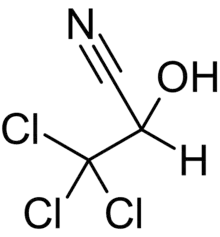 | |
| Names | |
|---|---|
| Other names
Chloral cyanhydrin Chloral hydrocyanate Chloral hydrocyanide Trichloroacetaldehyde cyanohydrin Trichlorolactonitrile | |
| Identifiers | |
3D model (JSmol) |
|
| ChemSpider | |
| ECHA InfoCard | 100.007.435 |
| EC Number |
|
PubChem CID |
|
| UNII | |
| |
| |
| Properties | |
| C3H2Cl3NO | |
| Molar mass | 174.41 g·mol−1 |
| Appearance | White solid |
| Melting point | 61 °C (142 °F; 334 K) |
| Hazards | |
| Occupational safety and health (OHS/OSH): | |
Main hazards |
Toxic |
Except where otherwise noted, data are given for materials in their standard state (at 25 °C [77 °F], 100 kPa).
Infobox references | |
Chloral cyanohydrin is the cyanohydrin derivative of chloral (trichloroacetaldehyde). It was historically used as a source of hydrogen cyanide for medicinal purposes.[1] Chloral cyanohydrin is toxic by inhalation.[2]
See also
References
This article is issued from Wikipedia. The text is licensed under Creative Commons - Attribution - Sharealike. Additional terms may apply for the media files.